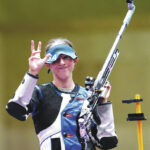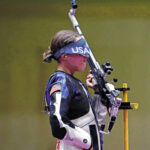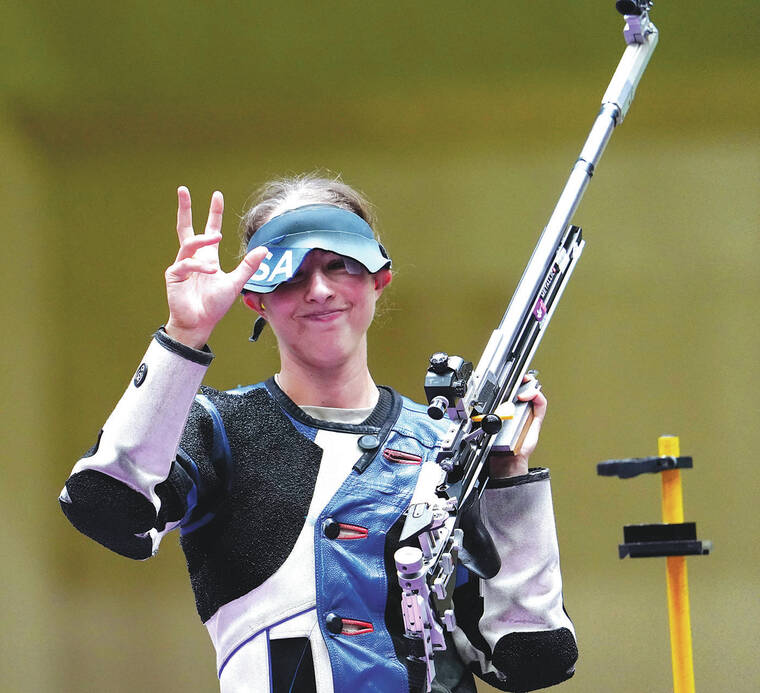An Olympian’s awkward packing list: Toothbrush? Check. Rifle? Check


COLUMBUS, Ga. — Olympic shooters have time-tested mental exercises they use to get through some of the most stressful moments of their careers: They exhale deeply to steady their nerves. They assess the targets ahead of them. They trust in the preparation that got them there.
Then, finally, they’re ready to check in at the airport.
ADVERTISING
Before the members of the U.S. shooting team got a chance to fire their rifles, pistols and shotguns this month in the Paris Games, they had to get them there first. And although international air travel is already among the most universally exasperating experiences on Earth, imagine doing it with a bunch of guns and ammunition in your luggage.
“I’ve learned the hard way about saying, ‘Oh, this is going pretty smooth,’” said Sagen Maddalena, 30, an American rifle shooter who will be competing at her second Olympics this summer. “You can get there six hours before the flight leaves, and it feels like you’re running to the plane every time.”
For globe-trotting shooters such as Maddalena, the airport is the crucible before the competition, a logistical bugbear with more hurdles than a track meet.
There’s the gear (heavily regulated and physically heavy). There are the airline firearm protocols (byzantine and inconsistently applied). And then there is the paperwork required to merely possess guns in various countries (voluminous).
There’s also the ever-present fear, worst of all, that one of their meticulously bespoke equipment could get misplaced altogether — a rare but real outcome that has temporarily derailed some shooters’ careers.
Add to all of this the obvious anxiety involved in bringing a weapon to an airport, and it’s no wonder many elite shooters approach travel with a creeping sense of dread.
“We just accept that when we get to the airport, it’s going to be a nightmare,” said Ivan Roe, 28, a rifle shooter attending his first Games this year.
The smallest slipup can spell disaster.
It was an innocent mistake, for instance, that once saw Will Shaner, 23, a gold medalist in the 10-meter air rifle event at the last Summer Games, spend hours inside a glorified holding cell at Munich Airport. His travel itinerary had changed at the last minute, causing his gun permit to expire the day before his flight home.
Airport officials informed him that meant he was technically “gun smuggling,” Shaner recalled, and that the consequences could be dire.
“Then all of a sudden they were like, ‘OK, just go — please, get out of our country,’” said Shaner, who said he was detained on another occasion when an X-ray machine detected a single stray bullet in his carry-on bag.
Airports in the United States, where gun laws vary by state, are accustomed to travelers who travel with firearms, properly or not. Last year, the Transportation Security Administration intercepted a record number at airport security checkpoints: 6,737. More than 90% of them were loaded when they were discovered.
Security officials in most other countries have less experience. Lucas Kozeniesky, 29, an air rifle shooter who won a silver medal at the Tokyo Olympics, recalled that customs agents in China once dumped his rifle pellets — several hundred of them — into a bowl and tried to count them by hand to determine if he had exceeded the legal limit.
Beyond the absurdity of the undertaking, Kozeniesky had also packed a few extra sets of pellets in his boots — something that could have landed him in hot water with Chinese authorities. “I was shaking a little bit,” said Kozeniesky, who was eventually let through.
Even if shooters follow the rules, though, they often encounter other arbitrary roadblocks.
Roe was trying to check in for a flight to Brazil from Argentina with some teammates this year when an airline employee suddenly informed them that the carrier did not transport firearms. Roe and his teammates spent 10 hours scrambling to find another flight on another airline.
not going to make it better.”
Shooters simply have to be more prepared and more patient than the average traveler, said Reya Kempley, a former operations coordinator for the American shooting team, whose full-time job was getting people where they needed to be. They have to show up earlier before departure and wait much longer upon arrival. They have to be more informed about airline rules than even most airline employees, and be able to cite them while staying on these airport staff members’ good sides. (Many now carry extra shirts, hats and other small gifts to curry favor.)
They also have more to lose. Vincent Hancock, a three-time Olympic champion in skeet shooting, said his current shotgun was worth about $15,000, and his set of competition glasses another $2,000.
More important, each gun has a level of customization and intangible feel that no amount of money can replace. Sarah Scherer, a two-time Olympian, learned this the hard way in 2013, when an airline misplaced the gun case with her air rifle after a trip to Europe. Months passed, and it didn’t turn up. She started training with a new model but couldn’t get comfortable with it. Her training seemed to evaporate.
“I was like, ‘Am I even going to be able to do the sport anymore? Is this the end?’” said Scherer, who was, to her relief, reunited with her lost rifle after almost a year.
Aside from their own anxieties, shooting athletes are also keenly aware that their presence can put fellow travelers on edge. Mary Tucker, 22, a silver medal-winning rifle shooter attending her second Olympics this summer, admits that she tells the occasional white lie to smooth interactions — with taxi drivers, for instance — while traveling.
“I’m just like, ‘Oh, it’s just a heavy-duty guitar case,’” said Tucker, who lives and trains in the Czech Republic.
Maddalena once had a desk agent become visibly frightened when she informed her, as part of normal protocol, that she had a gun in her luggage. She calmed the employee by walking her through the equipment piece by piece and explaining that she was an Olympian.
Those most at risk of freaking out, though, are the shooters themselves.
Just ask Anatoly Pikman, a former American pistol shooter, who was traveling to a competition in Guadalajara, Mexico, in 2015. Customs agents there were prepared for the arrival of shooters from around the world, but Pikman had a connecting flight through the city of Monterrey, where they very much were not. “That’s when the trouble started,” he said.
Pikman was initially flagged for lacking hard copies of his permits. Then, while he searched for those, security officers realized that he was carrying four times the legal number of bullets. According to Pikman, team officials had asked him to bring extra rounds to the event, and had assured him that the additional ammunition would not cause issues when he got to Guadalajara. In Monterrey, though, Pikman was told he was most likely headed to jail.
“I called my parents, my wife,” Pikman said. “Mentally, I was ready to be arrested.”
But at the eleventh hour, men wearing military uniforms entered the room, confiscated the bullets and informed Pikman he was free to go. Team officials, it turned out, had been on the phone all day, calling every contact who might be able to help.
Finally, someone from the Mexican Foreign Ministry intervened.
Free to leave but still shaken up, Pikman did not continue to Guadalajara. He got on the first flight home the next morning. Shortly after that, he retired from international competition.
© 2024 The New York Times Company






